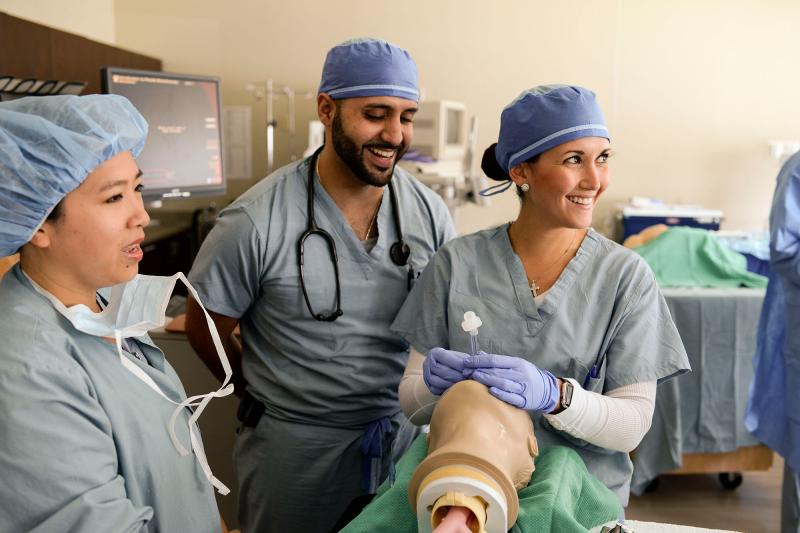- AdventHealth University

Part of becoming a certified registered nurse anesthetist (CRNA) means providing compassionate care during life’s critical moments. CRNAs play a major role in patient safety and comfort during surgical procedures and beyond. While it can be a demanding job, it’s deeply rewarding and requires dedication, critical thinking and a commitment to excellence. Keep reading to learn more about this profession, including what they do, steps to become one, required education and experience and expected salary.
What Is a Certified Nurse Anesthetist (CRNA)?
A CRNA is an advanced practice registered nurse (APRN) who has completed specialized education in anesthesia and passed a national certification exam. CRNAs are experts in administering anesthesia and related care to patients before, during and after diagnostic, therapeutic and obstetric procedures.
With a history dating back 150 years, nurse anesthetists have consistently been at the forefront of patient care, often serving as the sole anesthesia providers in rural and underserved areas, ensuring access to essential health care services. They practice with a high degree of autonomy and professionalism.
What Does a Registered Nurse Anesthetist Do?
CRNAs have many critical responsibilities that focus on patient safety and well-being. Their expertise is essential in various health care settings, including hospital operating rooms, emergency rooms, outpatient surgery centers, pain management clinics, plastic surgery offices, ketamine clinics and dental or oral surgery offices. Key responsibilities of CRNAs include:
- Collaborating closely with surgeons, anesthesiologists, physicians, dentists, podiatrists and other members of the patient care team
- Conducting thorough pre-anesthesia patient assessments and evaluations
- Continuously monitoring patients' vital signs, breathing, heart rhythm and overall physiological response throughout the procedure
- Developing and implementing individualized anesthesia care plans tailored to the patient and procedure
- Managing patients' airways and breathing during anesthesia
- Overseeing emergence from anesthesia and providing immediate post-anesthesia care, including pain management
- Recognizing and managing anesthesia-related complications or emergencies swiftly and effectively
- Skillfully administering various types of anesthetics, including general, regional (like spinals, epidurals or peripheral nerve blocks), and local anesthesia, sedation, as well as placing arterial lines and central lines
CRNAs are a vital part of a patient's care team. Because of the critical care they serve, extensive education is required.
How to Become a CRNA
The path to becoming a CRNA requires meeting specific educational and experiential milestones. Here’s a breakdown of the steps involved in becoming a registered nurse anesthetist:
Step 1: Become a Registered Nurse (RN) With a Bachelor’s Degree
To become a CRNA, you must first build a strong foundation in nursing principles. You’ll need to earn a Bachelor of Science in Nursing (BSN) degree from an accredited institution. While a BSN is the most common undergraduate degree, some graduate programs, including AdventHealth University’s, may consider applicants with an Associate of Science in Nursing (ASN) coupled with a bachelor’s degree in a related science field.
After completing your degree, you must pass the National Council Licensure Examination (NCLEX-RN) to become a licensed RN.
Step 2: Gain Critical Care Experience
Gaining critical care experience is a fundamental step to becoming a CRNA. Before applying to a nurse anesthesia program, you need to gain experience working as an RN in a critical care setting. This could be an intensive care unit (ICU), surgical ICU, medical ICU, NICU or cardiovascular ICU. Gaining this experience is essential because it exposes you to managing critically ill patients, complex monitoring equipment, ventilators and potent medications like vasoactive drips, which are crucial skills for anesthesia practice.
The accrediting body’s minimum requirement is one year of full-time critical care experience. However, admission to CRNA programs is highly competitive, and many programs prefer or require two or more years of experience to ensure applicants are well prepared for the program's academic rigor. Some programs may also require, or strongly recommend, obtaining critical care registered nurse (CCRN) certification.
Step 3: Apply to and Complete an Accredited Doctoral Program
A new standard for entering the CRNA profession is to earn a doctoral degree. You must apply, be accepted and successfully graduate from a Doctor of Nurse Anesthesia Practice (DNAP) or Doctor of Nursing Practice (DNP) program specializing in anesthesia. These programs typically last three years (36 months) and involve intensive didactic coursework and extensive clinical training.
Graduation from a Council on Accreditation of Nurse Anesthesia Educational Program (COA) is required to be eligible for the national certification exam. So be sure the program you choose is COA-accredited. Admission requirements vary slightly between programs but generally include a strong GPA (3.0 to 3.2 or higher), specific prerequisite courses, letters of recommendation, a personal essay and an interview.
Step 4: Pass the National Certification Examination (NCE)
After completing your doctoral program, the final step is to pass the national certification examination (NCE). This exam is administered by the National Board of Certification and Recertification for Nurse Anesthetists (NBCRNA).
Passing the NCE demonstrates your competency and knowledge in the field and allows you to officially use the CRNA credential. When researching programs, consider their NCE pass rates. Doing so is a good reflection of the program's quality of education and preparation.
What Do Certified Registered Nurse Anesthetists Learn in School?
Key areas of study typically include:
- Advanced Health Assessment and Monitoring: Skills for comprehensive patient evaluation and interpreting complex monitoring data (ECG, invasive lines, etc.)
- Advanced Pharmacology: Detailed study of anesthetic agents, opioids, muscle relaxants, vasoactive drugs and other medications used in anesthesia
- Advanced Physiology, Pathophysiology and Anatomy: In-depth understanding of human body systems and how disease processes affect anesthetic management
- Anesthesia Equipment Operation and Safety: Understanding the mechanics, proper use and troubleshooting of anesthesia machines, ventilators and monitoring devices
- Anesthesia Principles and Techniques: Covering general, regional and monitored anesthesia care for diverse patient populations (pediatric, geriatric, obstetric) and various surgical specialties
- Chemistry and Physics Applied to Anesthesia: Principles underlying gas laws, fluid dynamics and the function of anesthesia equipment
- Evidence-Based Practice and Research Methods: Learning to appraise research and apply evidence to clinical decision-making critically
- Extensive Supervised Clinical Practice: Accumulating thousands of hours of hands-on experience administering anesthesia in real-world settings under the guidance of experienced CRNAs and anesthesiologists
- Intensive Clinical Simulation Training: Practicing skills and managing critical events in a safe, controlled environment
- Leadership, Policy and Ethical Considerations in Health Care: Understanding the CRNAs' role in the broader health care system, advocacy and ethical practice
Doctoral nurse anesthesia programs provide a comprehensive education that prepares graduates for the complexities of anesthesia practice.
How Much Does a Certified Registered Nurse Anesthetist Make?
CRNAs are the highest-paid nursing specialists. According to the American Association of Nurse Anesthesiology 2023-2024 Compensation and Benefits, the median salary for a CRNA was $270,000, increasing from $251,000 in 2023. It’s important to note that a CRNA's salary will vary based on several factors, including location, years of experience, type of practice setting and specific employer.
The Bureau of Labor Statistics projects employment for nurse anesthetists, nurse midwives and nurse practitioners to grow by 40% from 2023 to 2033, which is significantly faster than the average growth rate for all other occupations. This indicates a strong and growing demand for qualified CRNAs across the country.
Start Your CRNA Career at AdventHealth University
Choosing the right program is essential in your journey to becoming a CRNA. At AdventHealth University, we’re dedicated to developing skilled professionals and preparing our graduates to practice health care with expertise and uncommon compassion. Our whole health education values of belonging, well-being and purpose guide everything we do.
If you’re ready to pursue this career, consider the strengths of our COA-accredited Doctor of Nurse Anesthesia Practice (DNAP) program:
- Expert Faculty and Resources: Learn from experienced CRNAs in our state-of-the-art facilities in Orlando, Florida.
- Proven Success: Our graduates achieve outstanding outcomes, with a 96% NCE pass rate within 60 days and a 100% employment rate within six months for the class of 2024.
- World-Class Clinical Opportunities: Benefit from diverse clinical experiences within the nationally recognized AdventHealth system in Central Florida. AdventHealth Orlando is recognized as the #1 health care network in Florida and among the top 20 hospitals in the nation by U.S. News & World Report.
If you’re ready to begin your journey of becoming a CRNA, request information and a team member will reach out to you and answer any questions you have to help you get started.


